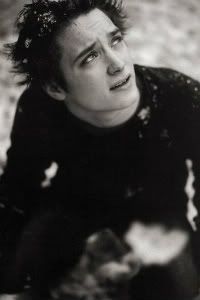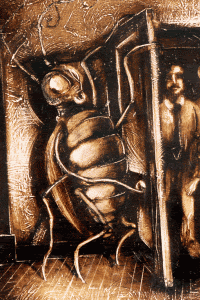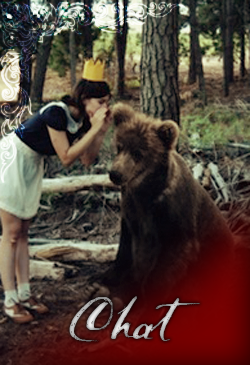Post by GABRIEL BLAZEK on Feb 2, 2012 19:59:01 GMT -5
...gabriel blazek *
* "Look how these roomers are gorging themselves, and I'm dying!" *
[/size]* "Look how these roomers are gorging themselves, and I'm dying!" *


...basics*
name Gabriel Blazek
nickname Don’t call him Gabe. He doesn’t like it.
age 23
gender Male, clearly.
grade N/A
hometown Horovice, Czech Republic
sexuality Undecided
personification Gregor Samsa
status AWAKE
face claim Elijah Wood
...appearance*
hair color Chocolate brown, usually kept relatively short. If it gets any longer than his ears, he tends to pull at it.
eye color Bright, bright blue. His eyes are usually very wide and have a sort of innocent quality to them.
build Compact, but not entirely wimpy.
height 5’6” – short for a man
clothing style Professional. Blazers, ties, button-down shirts, vests. Sometimes he wears a rather large pair of reading glasses; he’s a bit farsighted. He’s also fond of knit sweaters.
distinctive traits Gregor’s most distinctive trait is that he is remarkably unremarkable. He also has a rather bad case of schizophrenia, and always seems to be cold, even in summer.
...personal*
personality
If there is one thing that Gabriel Blazek is, it is devoted. He was raised in a family that put a great amount of emphasis on finishing what one starts, and so, no matter what task is set before him, Gabriel always puts his heart and soul into completing it, without questioning. He is an exceptionally hard worker, and what he lacks in raw passion, perhaps, he makes up for in results. As a worker, he never takes sick days, he never skips work, and he never takes personal days. He has become exceptionally adept at handling large quantities of stress at once without a breakdown, chiefly because he is incredibly organized.
In fact, Gabriel is all but a neat freak. He likes it when everything has its proper place – he sees it as respectful, towards the item, those who exist around it, and himself. Slight imperfections tend to bother him – picture frames a little misaligned, books out of order. However, few things can really ruffle Gabriel, as he is usually remarkably calm. He always seems to be collected and very “together” in public, albeit he does have a tendency to be uptight and fearful. Despite the pretense of composure, Gabriel has always been very socially clumsy, awkward, always saying the wrong things. His self-esteem isn’t very high, and he’s extraordinarily shy, quiet, and reserved. He has a stutter that he has been unable to shake since childhood, despite numerous speech classes – it is not a speech problem, but rather a result of his own mental state. Gabriel tends to detach himself from the rest of the world, and society has isolated him willingly at his request without a second thought. He likes to be alone, and he has long ago forgotten how to relax; he spends most of his time working, and this makes him productive and prolific. The work he produces is usually of a high caliber. He is also exceptionally artistic, though the pursuit of the arts as a career has been denied him, and he has given up on it. However, he still sketches a great deal. He has whole notebooks full of sketches hidden in his drawers and closets, and doodling tends to help him focus.
Gabriel has a good deal of potential for greatness in him. Under the right circumstances, he could be a remarkable leader. He is innovative, meticulous, and reliable – unfortunately, he has not had much control of his actions over the course of his life. His hardworking parents instilled him with very specific values and a very specific framework into which he was made to fit his life. At the age of 18, Gabriel was forced to take over as breadwinner of his family and move his mother, father, and younger sister to Prague, where he began an unyielding quest for work. The amount of responsibility was crushing to Gabriel – he has never made the decisions in his family, but he has been held responsible for the income. Fear of letting down his family made him a generally nervous individual, detached from the rest of the world by his irrational terror of being unable to support the ones he loves. And, surprisingly, he does love his family, more than anything, despite everything that has happened.
He tends to grow very attached to those who are close to him, but it is difficult to get close to him in the first place. Gabriel is introverted and private. He does not trust very easily. At the same time, he is a complete pushover; he allows himself to be manipulated. He has been subjugated for most of his life, and it has made him indecisive and submissive – he tends to go along with whatever those above him think is right, without thinking for himself. Gabriel refuses to acknowledge that he is intelligent and worthy of praise and attention. He has no idea how to take a compliment, and certainly no idea how to be in charge of his own life.
Gabriel has a very low level of self-confidence. He doesn’t trust himself and often finds himself doubting his own decisions, particularly after leaving his family. Morality is something that perplexes him and he doesn’t fully understand the concepts of right and wrong, except on a basic level. This often leads him to lie to others for no better reason than suspicion.
Which leads into one very important aspect of Gabriel: he is paranoid.
It fits quite nicely into his diagnosis.
Simply put, Gabriel has schizophrenia, a classified psychotic disorder that ruthlessly twists his reality and makes it horrific and terrible. He suffers from delusions and paranoia, as well as hallucinations, both auditory and visual. This, more than anything, has alienated him – not only from his family, who rejected him because of it, but from all the world, because he cannot trust his perception of it. To doubt the whole of reality is a mentally trying thing for a smart young man like Gabriel, and it tortures him without end. Having received treatment and some medication, Gabriel has been able to return to at least a facade of calmness, one that is precariously preserved through the sparse usage of probably-not-enough antipsychotic drugs.
He was not always so mentally ill, but he most likely will be for some time to come, and it begs the question as to why he insists on living on his own these days when half the time he’s seeing imaginary – though docile – cockroaches infesting his closet. He is also particularly harangued by an enormous bug that he somehow knows is named Gregor Samsa, and though the two cannot communicate and thus Gabriel does not know why he is there, Gregor has never done anything to harm him and is in fact helpful and friendly. Because of this communications gap between reincarnate and canon, Gabriel does not know he is awake – he assumes that Gregor is a hallucination, though he often converses with him anyway. Gregor is Gabriel’s only friend.
Gabriel is the epitome of awkward and naive when it comes to romantic relationships and sex. Despite being fairly attractive and 23 years old, Gabriel is still a virgin, simply because he isn’t very good at forming any sort of relationship, let alone a romantic one. Men and women alike have expressed interest in him in the past, but flirting just tends to confuse him – he takes it too literally and he’s very bad at it. Though he deep down possesses the heart of a poet, he has a very hard time showing it, and the fact that he’s mentally ill doesn’t really seem to help him along.
Honestly, though, Gabriel is miserable. He is sad, homesick, and lonely, and in a strange place like New York, he has no idea how to reach out to people. It doesn’t help that his English isn’t very good.
past
When Gabriel Blazek was born, the first child of Dominik Blazek and his wife, the Blazek family had a rather successful business going on. Dominik was a carpenter whose services were in demand in the small town in which they lived – once the Iron Curtain was at last lifted, especially – and he made a comfortable living for himself and his small family making and mending furniture.
Gabriel grew up with two hardworking parents who raised him to be polite, courteous, a gentleman, and a worker. He spent his school days reading, as he was never particularly interested in playing with the other children. This concerned his parents, but they did not protest, so long as he got good grades.
Still, Gabriel never really fit in with his parents. They didn’t truly understand him, and he certainly didn’t comprehend them – from the start, he was estranged in his own home simply by differences in perception and awareness. Gabriel was always considered “odd” as a boy, as many teachers noted; at the same time, however, he was not a troublemaker. He was always perfectly sweet and very well-behaved. He never even spoke out of turn, a result of a strict disciplinary code in his home, in which even minor transgressions resulted in a thrashing. This made Gabriel reserved, submissive, and overly courteous to everyone he met.
Many of Gabriel’s primary school teachers noticed that Gabriel was artistically talented – however, it was never something that his parents encouraged.
When Gabriel was six years old, his little sister, Alzbeta, was born. Her safe birth was a great relief, as his mother was already 43 years old, and that she had gotten pregnant at all was a miracle in itself. Gabriel treasured his younger sister and protected her with his life; in general, Alzbeta was pampered, coddled, and spoiled by her whole family, which made her soft and dependent. Gabriel encouraged her to take up the violin, and always came to all of her recitals, regardless of prior plans.
When Gabriel graduated from primary school, he moved on to secondary. He spent two years at the Gymnasium, where he got above average grades, before moving on to a public university. Now away from his parents and free of his old life, he thought that perhaps he would have a chance to discover himself (and yet, he still chose a practical field of study – business – instead of art).
But it was not to be. When Gabriel was 18, studying hard at university, he received some dire news from back home. His father’s business had gone bankrupt. His family was without a single financial support.
Regretfully, Gabriel was forced to discontinue his secondary education in order to come home to his family and begin earning money for them. His parents were too old, and his sister was too young, he thought. Thus, he took the entire task of being the family’s support onto his youthful shoulders, and took up a job as a salesman.
Gabriel was not a very good salesman, but he was consistent and loyal, and he worked and worked and worked for four years. He bought his family a new apartment. He made sure they were fed and clothed. But, within a year, his family no longer fully appreciated how much Gabriel did for them. They took for granted the fact that he would always be there, earning money for them, and that continued to weigh and weigh and weigh on Gabriel.
Debts piled up. Gabriel worked harder. He took on more shifts and more work. He earned as much money as possible, all the time mourning the education he had not been able to complete, but too blinded by devotion to his family to return to it.
Gabriel worked and worked and worked and received no gratitude for it, until, one day, he snapped.
He experienced a psychotic break, and for three months, he was utterly convinced he had transformed into a giant bug.
His family, of course, was terrified, bewildered by his alarming behavior and unsure how to deal with it. They did not call the police – they did not want any of the neighbors to know they had a crazy son. No help was sought for Gabriel, although he now crawled everywhere and refused to eat normal human food. No sympathy was awarded him by his father, who, strict as always, insisted he stay in his room at all times. For three long months, Gabriel’s only comfort was his sister, who brought him food, and who he could often hear practicing the violin.
He was distraught. In this state, he was unable to help his family – and so, they had to help themselves.
They became resentful. They hated their situation, and they grew to hate Gabriel. His sister stopped feeding him as often. She became domineering, making decisions for him without even considering his feelings, which she no longer understood. His room grew dirty because no one would clean it. He was permanently removed from all family matters. He was alone.
One day, upon his sister’s insistence, he was chased from the house without even a goodbye, left on his own to wander the streets, a poor, mentally ill young man, now without a family or any friends.
After spending several nights on the streets, Gabriel was found by the local police, passed out and emaciated. He was taken to a homeless shelter, where he received medical attention and was treated for several untended injuries, courtesy of his father. Upon his recovery of consciousness, he was relieved to discover that his delusion had faded – he was human once more.
And that was when the bug began appearing to him.
It was a huge bug, a human-sized cockroach, like what he had thought he was – and somehow, Gabriel knew it was named Gregor Samsa, though the creature could not speak to him. At first, he was terrified of it; he would scream, startling the poor creature, which seemed nervous around him, though it had no reason to be. However, as the bug continued to appear and showed itself to be harmless, Gabriel began to relax. He started to speak to it. It became his only friend.
Before he got back on his feet, Gabriel was diagnosed with severe schizophrenia, which had surfaced when his mental welfare had cracked under stress and resulted in his psychotic break. He was given medication and kept in a psych ward for observation until he was declared to be stable.
Upon his release, Gabriel took all the money he could scrape together and headed as far away from his family as possible, though they still remained pure and uncorrupted in his heart. He could see no wrong in them. He just wanted to free them from his presence as much as possible.
So he started out for America, land of opportunity.
present
Gabriel knows English, but it isn’t very good; however, his credentials have earned him a fairly steady job and enough money for an apartment. He is working his way up quickly with his shocking work ethic and ability, and he is studying English almost constantly in his spare time. Compared to Czech, which conjugates names, the language is fairly simple.
However, Gabriel is still alone. His only companion is Gregor, and his medication is expensive. He lives alone, and he is still tortured by delusions and hallucinations despite his medication. Oftentimes, he hears voices in his head, or hallucinates that there are bugs crawling around in his house. The medication keeps such delusions from becoming too severe, but Gabriel still suffers.
Still, it’s a living, and though he isn’t happy, at least he is alive and human.
family
Dominik Blazek, father, 65, chief of security at a bank, estranged
Berta Blazekova, mother, 60, seamstress, estranged
Alzbeta Blazekova, younger sister, 17, estranged
likes
Peace and quiet
Good, honest work
Professional behavior
Etiquette
Order
Europe
Nonfiction
Nonviolence
Coffee
Tea
Speaking Czech
dislikes
Speed
Laziness
Disorder or messiness
Bugs (particularly cockroaches)
Artificial flavoring
Wrinkled clothes
Anyone with authority over him (he secretly resents them)
Soda
Dairy products (he’s lactose intolerant)
Loud sounds
American idioms and slang (he doesn’t understand them)
other notes Gregor appears to Gabriel only in his insect form. Since Gregor cannot communicate very well as a bug, the relationship between reincarnate and canon is strained, full of frustration on Gregor’s part and terror on Gabriel’s.
Also, though mentally ill, Gabriel is not dangerous. He wouldn’t hurt a fly.
...literature*
book title The Metamorphosis by Franz Kafka
backstory One morning, Gregor Samsa, a traveling salesman and sole breadwinner of the Samsa family, wakes up to discover that he has been transformed into a giant bug, and has missed his train. At first, he is concerned, but he seems to rather quickly accept his new form as reality – or else just a bad dream. Of course, when his manager comes to his house to see why he missed his train, he is forced to show himself to his family, all of whom are shocked. He is chased into his room and locked there.
After some time, his sister starts to bring him food. Gregor begins to adjust to his new form, and takes to crawling on the walls. His sister also cleans up; neither of his parents will enter his room, and when his sister comes in, Gregor always hides himself. Said sister takes the task of caring for Gregor on herself, and becomes an “expert” on his needs and wants. Of course, she knows nothing – for instance, she tries to move out the furniture in his room, something that Gregor is clinging to as a remnant of his humanity. He appears to stop her and startles his mother, who was helping his sister move furniture and is startled by his sudden emergence. Gregor is blamed for scaring her, and runs into the kitchen when his sister, Grete, yells at him. When his father returns, he chases Gregor about the house and begins throwing apples at him, one of which becomes lodged in Gregor’s back. No-one removes it, so it remains there.
Time passes. His family, all of whom were dependent on him, begins to buck up and take jobs in order to support themselves. However, the whole family no longer pities Gregor – instead, they have come to resent him. They no longer care for him. His sister becomes negligent of him, hardly cleaning and only shoving in food; the whole Samsa family is forgetting Gregor. Gregor stops eating. The family takes on some very rude boarders for extra money.
One day, his sister is playing violin for the boarders. Gregor inches out of his room in order to listen, but is caught. The boarders are fascinated, but the father insists they go back into their rooms, at which point the boarders announce that they will leave.
Later, Grete tells her parents that they must get rid of Gregor. At this point, Gregor is weak, injured, and starving, and his family doesn’t believe he can understand them, but he can. Crawling into his room, he reflects on how much he loves his family and doesn’t want to burden them. Then, exhausted by the mere effort of movement, Gregor collapses and dies shortly after, alone and unloved.
...roleplayer*
name Zelda
age really
rp sample bugsandexistentialism
rp experience books
how you found ouac about
gender likes













